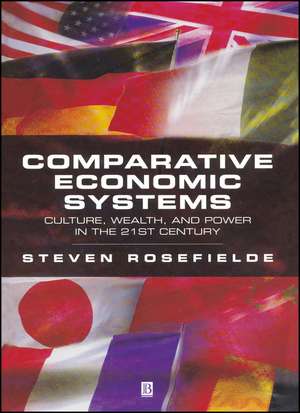Comparative Economic Systems: Culture, Wealth, and Power in the 21st Century
Autor S Rosefieldeen Limba Engleză Paperback – 18 mar 2002
Comparative Economic Systems: Culture, Wealth, and Power in the 21st Century explains how culture, in various guises, modifies the standard rules of economic engagement, creating systems that differ markedly from those predicted by the theory of general market competition. This analysis is grounded in established principles, but also assumes that individual utility seeking may be culturally determined, that political goals may take precedence over public well-being, and that business misconduct may be socially detrimental.
The book clarifies conceptual misunderstandings about the comparative merit of free competition and perfect governance, showing in many cases how the same results are attainable using either mechanism, or by combining them. It illuminates why engineering variables such as the quantity and quality of fixed and variable inputs, management, entrepreneurship, technological progress, and economic governance do not adequately explain disorders like the increasing poverty of the world's poorest nations.
End-of-chapter questions and an extensive glossary enhance the book's utility and enable readers to fully comprehend the key features of each chapter.
Preț: 453.97 lei
Preț vechi: 493.45 lei
-8% Nou
86.88€ • 90.37$ • 71.72£
Carte tipărită la comandă
Livrare economică 14-28 aprilie
Specificații
ISBN-10: 0631229620
Pagini: 304
Dimensiuni: 170 x 244 x 17 mm
Greutate: 0.52 kg
Editura: Wiley
Locul publicării:Chichester, United Kingdom










